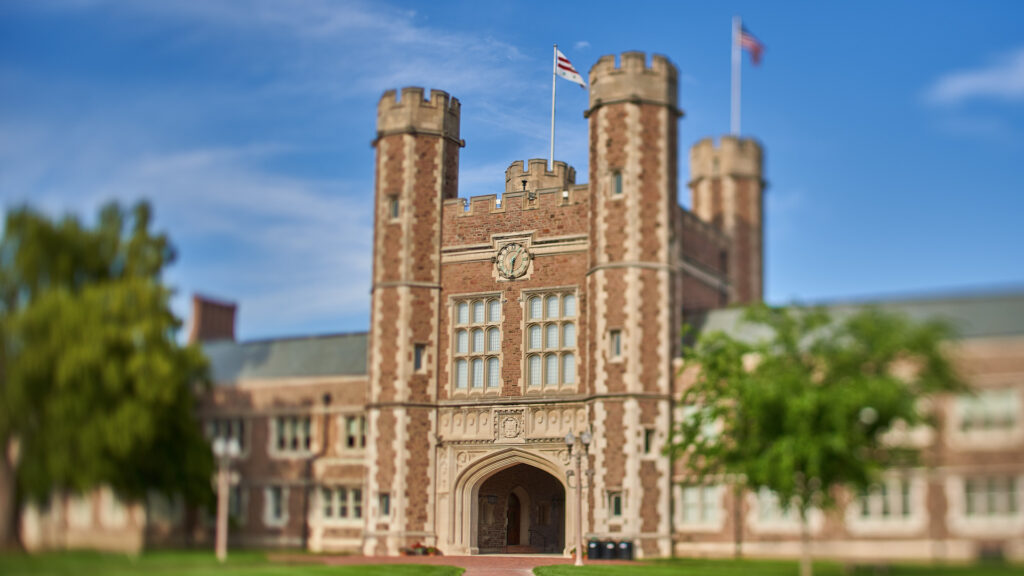We know that WashU can be a better place with a deeper range of perspectives and community members. It is this diversity that makes great institutions like ours truly great. Through inclusive policies and a range of resources, we are laying the foundation for a community that embraces and supports inclusive excellence.
Progress timeline
WashU has a rich history of activism and progress. This timeline highlights some institutional and academic milestones.
2022
- Each school has diversity leadership.
- Here and Next, the WashU strategic plan, includes equity, diversity, and inclusion as a guiding principle for the university.
- Make Way: Our Student Initiative launches to make a WashU education more affordable for all students.
2021
- Gateway to Success, a historic $1 billion investment in student financial aid, allows WashU to adopt a need-blind undergraduate admissions policy
2020
- In June, WashU committed to a number of concrete actions geared toward addressing systemic racism and its toll on our Black communities.
- These commitments led to the founding of the Equity and Inclusion Council.
- With the goal of building a world-class research program on race, the Office of the Provost launches a multi-year Race and Ethnicity Scholarship Cluster Hiring Initiative.
2019
- The Center Race, Ethnicity, and Equity (CRE2) was founded to bring the research force of Washington University together to study how race and ethnicity are integral to the most complex and challenging issues of our time.
2018
- The Academy for Diversity, Equity, and Inclusion was founded.
- The Office of Diversity, Equity, and Inclusion at the School of Medicine was founded.
2017
- The Commission on Diversity and Inclusion issues their report, including over 200 recommendations for the university to demonstrate their commitment to inclusion and equity.
2016
- In April, the Asian American Studies minor was approved.
2015
- In February, the WashU Diversity & Inclusion Steering Committee recommends a formal commission.
- Human Resources establishes diversity training courses.
- Chancellor Mark Wrighton and Provost Holden Thorp convene the Commission on Diversity and Inclusion.
2014
- In August, Michael Brown is killed in Ferguson, Missouri, sparking campus activism and dialogue.
- The MOSAIC Project, which would go on to be the Center for Diversity and Inclusion in Student Affairs, was founded.
2010
- The Vice Provost for Faculty Affairs and Institutional Diversity office was created.
1990
- The Kathryn M. Buder Center for American Indians was founded with the mission to empower and prepare Native students for professional leadership in Native communities through education.
1972
- WashU in St. Louis launched one of the nation’s first academic programs in women’s studies. Over time, this program evolved in name and scope into the department that is now called Women, Gender and Sexuality Studies.
1969
- Black Studies was formally established in September. Fifty years later, the program would become a full department, now known as African and African-American Studies.
1968
- In December 1968, acting similarly to their counterparts across the nation during that turbulent year, the Association of Black Collegians (ABC) confronted the administration with a position paper during the take-over of Brookings Hall. This paper’s list of demands was later expanded as The Black Manifesto, which became a kind of bill of rights and expectations for black students at the university.
- One of the principal demands was the institution of a Black Studies Program, “which will radically reform our future education.” The document continues, “We ask for this Black Studies Program because we feel it is not only necessary for our education, but for our very survival.”
1967
- In October 1967, African American students at WashU formally announced in the student newspaper the formation of the Association of Black Collegians (ABC).
1942
- In spite of the executive order calling for the internment of Japanese-Americans, WashU welcomed 30 Japanese-American students to campus.
1869
- The School of Law becomes the first chartered law school in the United States to admit women.
